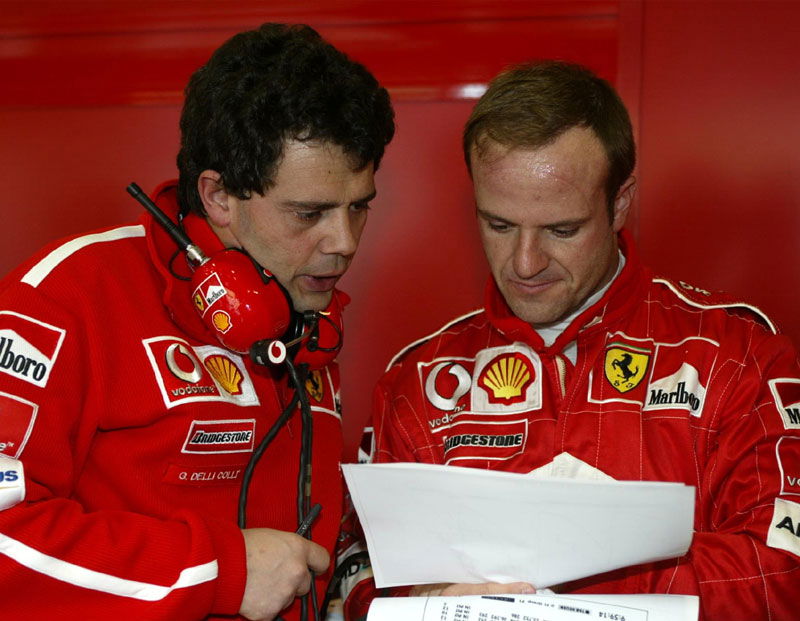Feature: Rubens' race engineer, improvisation.
Gabriele Delli Colli, the 36-year-old Italian race engineer for Rubens Barrichello, will be going to the German Grand Prix on a high.
'His' driver, Rubens Barrichello, scored his first win of the season after a superb drive and a strong weekend at the British Grand Prix two weeks ago.
It was a performance that did not really come as a surprise to Gabriele, around a track that both he and Barrichello know better than most other circuits on the Grand Prix calendar.

Gabriele Delli Colli, the 36-year-old Italian race engineer for Rubens Barrichello, will be going to the German Grand Prix on a high.
'His' driver, Rubens Barrichello, scored his first win of the season after a superb drive and a strong weekend at the British Grand Prix two weeks ago.
It was a performance that did not really come as a surprise to Gabriele, around a track that both he and Barrichello know better than most other circuits on the Grand Prix calendar.
After leaving Alfa Romeo's touring car team when they stopped racing, Gabriele came into F1 with Minardi and then worked for Sauber and Jordan before joining Ferrari. His year at Jordan, just across the street from Silverstone, meant that he, like Barrichello, after his early racing career and spell as a Jordan driver, both knew the quirks of the Silverstone track by heart.
"It was also one of the few tracks that we can test at before the race, so we had a pretty good idea of how the car should be set-up before we even arrived for the race. After that, it was just a case of fine tuning it for the race and the conditions of the day," points out Gabriele, which is where his and Barrichello's local knowledge gave them the edge.
Even on a track where the team has not run for a year, like Hockenheim, the extensive simulation programs, which Ferrari run at the factory before each race, saves a lot of vital track time sorting out the basic set-up during the reduced practice time available to the drivers this year.
In some teams there is a 'them and us' rivalry between the two drivers, with only limited sharing of information, but as Gabriele is quick to point out, Scuderia Ferrari is a team effort in every sense of the word, even between the two drivers themselves, however much they might want to beat each other on the track.
"At the end of the day, the only important thing is that it is Ferrari that has to win," commented Gabriele, "We are a team and I am working for Ferrari. It does not matter who wins. The best thing is that both cars do well. That is the final target of my job and the team job.
"I know outsiders might think the team is divided into two parts, but there are two race cars and the collaboration is very open. If I find something good, or if Michael's engineers find something, then we share it. Because we have very little time during a race weekend, so you are obliged to divide the workload. One car works in one direction and the other in another. Before qualifying or before the race, we have an open discussion about what we have done and we try to share what we have found.
"Most of the times, the two cars are very similar. The basic set-up of the car is similar and then there are only little details, which each driver prefers. It is like a suit - the shape is the same, but then you have little things to adjust, because the driver drives in a different way. We have to divide the work, or it would take too much time. It is normal for one driver to concentrate, for example, on tyres, while the other is working on downforce levels, or something else. Then in the evening we decide what is the best way to go.
"We know the difference between the two drivers in terms of what set up they like. Every run you do, Ross Brawn collects information from both cars and he then feeds everyone with all the good things we have found or the things that have not worked. Otherwise, you would not get a good race result."
Every step of the way, every adjustment on the car is backed up by mountains of telemetry data that has to be studied and acted upon. So, has the old-fashioned idea of an experienced race engineer that could make or break a driver's weekend now become obsolete?
Not according to Gabriele. His understanding of the track, the car and, above all, his driver, and the engineer's ability to improvise is just as vital as the telemetry that backs up those judgments.
"Improvisation is still a big part of a race engineer's job," noted Gabriele, "You can simulate everything, and you have really good support from simulation programmes. In the factory there are also a lot of people studying the data. However, what is important in terms of improvisation is to understand the right moment to make a change on the car, or how to assess a tyre compound. It is the little details you have to work with to get the best out of the car set-up and the whole package, in terms of tyres, downforce levels and so on at the precise moment that you need it.
"The simulation is good because you can prepare a lot of things. But with experience, you know which is the most probable situation at any point during the race weekend. You can think about different solutions to see which is the best and be prepared. The difficulty of the job is being ready at the right time. Sometimes there is a right moment to test something or there is a right moment to step back a bit and say, let's leave the car as it is. For the driver it is a question of having confidence in the car. At some point it is better for him to drive a car he knows at the limit of its performance.
"The psychology comes into knowing when the driver has to go out and do a good job with what he has, or whether you should still be pushing for a solution that you think will improve the car. There is a common belief that in the future our job will be even more controlled by computers but in the end, drivers are human and sometimes it is difficult to understand them. A race engineer's job is to understand them and know when is the right time to do something."
Just like they did at Silverstone!

